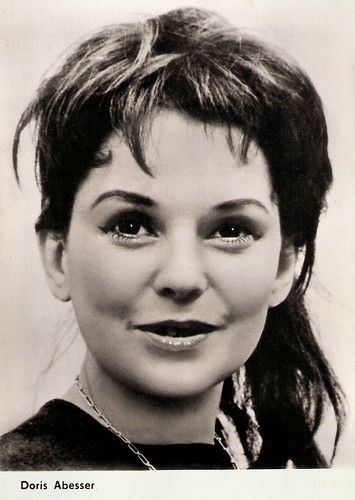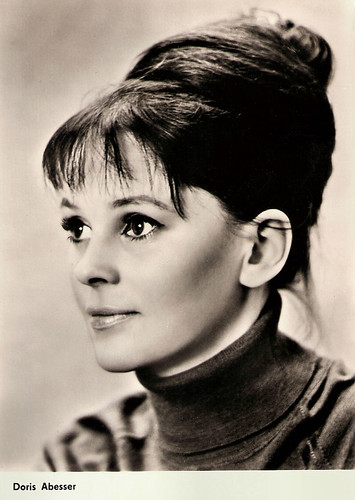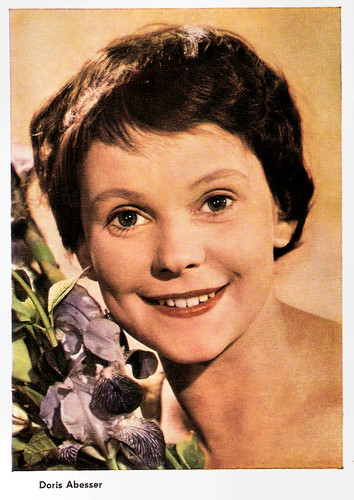
East-German postcard by VEB Progress Filmvertrieb, Berlin, no. 1368. Photo: DEFA / Neufeld.
Cold War years
Doris Abesser was born in Berlin in 1935. During her youth she discovered her passion for acting. At 16, she took her first acting classes and trained at the Drama School of the Deutsches Theater in Berlin.
In 1956, she made her stage debut at the Theater der Bergarbeiter in Senftenberg, where she worked for three years. In 1959, she moved to the Dresden State Theatre and two years later she went to play at the Volksbühne in Berlin.
During the Cold War years, she was used several times in anti-capitalist film productions of the former GDR. Her film debut was in the DEFA production Zwischenfall in Benderath/Incident in Benderath (János Veiczi, 1956) with Uwe-Jens Pape.
She appeared with Gisela May in the drama Eine alte Liebe/An old love (Frank Beyer, 1959). In Das Leben beginnt/Life Begins (Heiner Carow, 1959) she fled to the West and later came back disappointed. In Septemberliebe/September Love (Kurt Maetzig, 1960) she held her friend (Ulrich Thein) from such a flight.

East-German postcard by VEB Progress Filmvertrieb, Berlin, no. 1746, 1963. Photo: Thomas Klamann.

East-German postcard by VEB Progress Filmvertrieb, Berlin, no. 2115, 1964. Photo: Ludwig Schirmer.
The Witch of the West
In 1961, Doris Abesser was chosen as ´Filmliebling des Jahres 1961´ (Favourite Film Star of 1961) by the youth magazine Neues Leben, and she won 1961 the Erich-Weinert-Medaille (an art award of the FDJ - the official socialist youth movement of the GDR).
A success was the drama Professor Mamlock (Konrad Wolf, 1961), in which she played the Jewish Ruth Mamlock, the professor’s daughter.
Then she played in the DEFA film Der Frühling braucht Zeit/Spring takes time (1965), directed by her husband Günter Stahnke. The film investigates the causes of an industrial accident. To blame are amongst others the lack of competence and the inefficient operation of the enterprise, the distrust of non-party specialists. The socio-critical production was banned shortly after its premiere.
After this, the DEFA offered her no more lead roles in the studio’s productions. Years later, the film won two awards at the Berlin Film Festival 1990.
Abesser played in the theatre, such as at the Friedrich-Wolf-Theater in Neustrelitz, where she starred as Eliza Dolittle in the musical My Fair Lady and as the Witch of the West in The Wizzard of Oz. From 1968 to 1997 she was a member of the Metropol Theater in Berlin.
Since the 1990s, she performed in literary and musical programs on stage and on the radio. She also works for television, and guest starred in the crime series Polizeiruf 110 (1977, 1989, 1995), Tatort (2001) and SOKO Leipzig (2005). She also played the lead in the series Geschichten übern Gartenzaun/Stories over the garden fence (1982–1985).
Doris Abesser was married to the German director Günter Stahnke, but they divorced. The couple has a son, Robert (1963). Doris Abesser lives in Berlin.

East-German postcard by VEB Progress Filmvertrieb, Berlin, no. 1329 F, 1960. Photo: Kurt Wunsch.

East-German postcard by VEB Progress Filmvertrieb, Berlin, no. 2256, 1965. Photo: Schwarzer.
Sources: Ines Walk (FilmZeit.de – German), DEFA Sternstunden (German), Wikipedia (German) and IMDb.
No comments:
Post a Comment